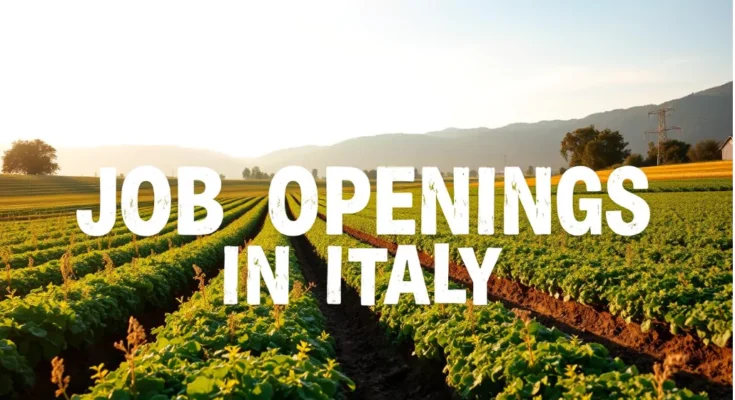Discover Agricultural Job Openings in Italy: What You Need to Know
Italy’s rich farming heritage offers a world of opportunities for those seeking Italian farming jobs. From the rolling hills of Tuscany to the fertile plains of Lombardy, agricultural employment in Italy is as diverse as it is rewarding. Whether you’re dreaming of working in sun-drenched vineyards or tending to olive groves, Italian farm work opportunities abound for both locals and foreigners alike.
The charm of Italy’s countryside is matched only by the warmth of its people and the richness of its culinary traditions. As you explore agricultural employment in Italy, you’ll find a unique blend of time-honored practices and modern farming techniques. This combination creates a dynamic work environment that attracts job seekers from around the globe.
Ready to embark on your Italian farming adventure? Let’s dive into what you need to know about finding and securing agricultural job openings in this beautiful Mediterranean country.
Key Takeaways
- Italy offers diverse agricultural job opportunities across various regions
- Both seasonal and long-term positions are available in Italian farming
- Vineyard and olive grove work are popular choices for foreign workers
- Knowledge of Italian language can be beneficial for securing farm work
- Understanding visa requirements is crucial for non-EU job seekers
- Italian agricultural jobs combine traditional methods with modern techniques
- The sector provides unique cultural experiences alongside employment
Overview of Italy’s Agricultural Industry
Italy’s agricultural sector is crucial to its economy and culture. The country’s landscape, dotted with vineyards and olive groves, reflects centuries of farming tradition. We delve into the economic significance, key regions, and current trends in Italian agriculture.
Economic Impact of Italian Agriculture
The Italian agriculture sector is a significant contributor to the nation’s GDP. In 2022, it accounted for 2.1% of the total GDP, employing over 900,000 people. Italy stands out as a major producer of wine, olive oil, and various fruits and vegetables in Europe.
Major Agricultural Regions in Italy
Italy’s farming regions are varied, each excelling in different crops and products:
- Tuscany: Known for wine and olive oil production
- Emilia-Romagna: Famous for Parmigiano-Reggiano cheese and balsamic vinegar
- Sicily: Produces citrus fruits, almonds, and tomatoes
- Piedmont: Renowned for its wine and truffles
Current Industry Trends
Italian agriculture is moving towards sustainability and innovation:
| Trend | Description |
|---|---|
| Organic Farming | Italy leads Europe in organic agriculture, with over 15% of farmland certified organic |
| Precision Agriculture | Adoption of smart technologies to optimize resource use and increase yields |
| Agritourism | Growing popularity of farm stays and rural tourism experiences |
These trends are transforming the Italian agricultural scene, opening up new avenues for farmers and workers alike.
Types of Agricultural Jobs Available in Italy
Italy’s agricultural sector is rich and varied, offering a range of farming career paths. From traditional roles to cutting-edge positions, the Italian farm job market caters to all skill levels and interests.
Farm laborers are the core of Italian agriculture. They perform tasks such as planting, harvesting, and farm upkeep. Skilled roles include vineyard managers, who oversee grape production, and olive grove specialists, who manage olive harvests.
Livestock farmers are vital in Italy’s dairy and meat sectors. They care for animals, manage breeding, and ensure proper nutrition. Cheesemakers, particularly in regions known for artisanal cheeses, are in high demand.
For those drawn to technology, precision agriculture specialists use drones and data analysis to enhance crop yields. Agronomists and soil scientists focus on improving farming practices and sustainability.
| Job Type | Required Skills | Primary Responsibilities |
|---|---|---|
| Vineyard Manager | Viticulture knowledge, leadership | Overseeing grape production, wine quality |
| Olive Grove Specialist | Tree care, harvesting techniques | Managing olive trees, ensuring oil quality |
| Precision Agriculture Technician | Tech-savvy, data analysis | Implementing smart farming techniques |
Whether you’re looking for seasonal work or a long-term career, Italian agriculture has much to offer. It spans from hands-on farming to advanced, tech-driven roles. Italy’s diverse farming landscape welcomes all skillsets.
Seasonal Work Opportunities in Italian Farming
Italy’s agricultural sector is rich with seasonal farm work opportunities. From grape picking to olive harvesting, these jobs draw both locals and international workers. Let’s delve into the key areas for seasonal employment in Italian agriculture.
Harvest Season Jobs
Italian harvest jobs abound during peak seasons. Fruit picking is a favorite in regions like Emilia-Romagna and Trentino-Alto Adige. You might find yourself picking apples, peaches, or cherries. Vegetable harvesting is also popular, with tomatoes and artichokes being major crops in Puglia and Sicily.
Vineyard Work Positions
Vineyard employment is a significant part of seasonal farm work in Italy. Tuscany, Piedmont, and Veneto are famous for their wine production. Roles include pruning vines, tying branches, and grape harvesting. Some vineyards also hire for wine production and cellar management during peak seasons.
Olive Grove Employment
Olive harvesting is another critical seasonal job in Italy. Regions like Liguria, Umbria, and Calabria are home to extensive olive groves. Workers are needed for picking olives by hand or with small tools. Some farms also offer positions in olive oil production, offering a unique experience in this traditional Italian industry.
| Job Type | Peak Season | Main Regions |
|---|---|---|
| Fruit Picking | May – September | Emilia-Romagna, Trentino-Alto Adige |
| Vineyard Work | August – October | Tuscany, Piedmont, Veneto |
| Olive Harvesting | October – December | Liguria, Umbria, Calabria |
Requirements for Agricultural Work in Italy
To secure a farm job in Italy, one must fulfill certain criteria. This includes legal documents, language proficiency, and practical skills. Understanding these requirements is essential for those interested in agricultural work.
Visa and Work Permit Requirements
Non-EU citizens need an Italian work visa to start farm work. They must first secure a job offer from an Italian employer. Then, they apply for a work permit. EU citizens have it easier, needing only to register with local authorities upon arrival.
Language Prerequisites
While not always required, speaking some Italian can significantly improve job prospects. Many farms look for workers with at least basic Italian skills. The language needs vary based on the job and employer.
Required Skills and Qualifications
The skills needed for farm work in Italy vary by job. General farming knowledge, physical fitness, and adaptability are common requirements. Some roles may also demand experience with specific crops or machinery.
| Job Type | Skills Required | Experience Level |
|---|---|---|
| Fruit Picker | Dexterity, Stamina | Entry-level |
| Vineyard Worker | Pruning, Harvesting | 1-2 years |
| Tractor Operator | Machinery Operation, Safety Protocols | 2-3 years |
| Farm Manager | Leadership, Crop Planning | 5+ years |
Meeting these criteria can lead to various agricultural opportunities in Italy’s beautiful countryside.
How to Find Agricultural Jobs in Italy
Securing farm work in Italy demands a blend of modern job search tactics and traditional networking. The Italian agricultural sector presents a wide array of opportunities for those eager to explore different paths.
Online platforms serve as an excellent starting point for uncovering Italian farm job listings. Sites like AgriJobs.it and WorkinItaly.com regularly post seasonal and permanent agricultural roles. These platforms enable filtering by region, skill level, and job type.
Agricultural recruitment agencies are pivotal in bridging workers with employers. Firms like Adecco and Randstad boast specialized agricultural divisions. They manage the paperwork and offer support throughout the hiring process.
“Networking remains the most effective way to secure farm work in Italy. Many opportunities are filled through word-of-mouth before they’re advertised.”
Local job centers (Centri per l’Impiego) in rural areas are invaluable resources. They maintain listings of nearby farm jobs and offer personalized assistance in your search.
| Job Search Method | Effectiveness | Best For |
|---|---|---|
| Online Job Boards | High | Tech-savvy job seekers |
| Recruitment Agencies | Medium | International workers |
| Local Job Centers | Medium | Residents and EU citizens |
| Networking | Very High | All job seekers |
Social media platforms like LinkedIn and Facebook groups focused on Italian agriculture are excellent for job leads and industry insights. Join these communities to stay updated on opportunities and connect with potential employers.
Salary Expectations and Benefits
For those eyeing a career in Italy’s farming sector, grasping the financial landscape is key. This includes understanding Italian farm worker salaries, agricultural job benefits, and the cost of living. Let’s delve into the financial aspects of working in agriculture in Italy.
Average Wages by Position
Salaries for Italian farm workers differ based on their role and experience. Entry-level roles often come with lower pay, whereas more experienced or specialized positions command higher earnings. Below is a table illustrating average monthly salaries in the agricultural sector:
| Position | Monthly Salary (EUR) |
|---|---|
| Farm Laborer | 1,200 – 1,500 |
| Tractor Operator | 1,500 – 1,800 |
| Livestock Manager | 1,800 – 2,200 |
| Farm Manager | 2,500 – 3,500 |
Additional Benefits and Perks
Many agricultural jobs in Italy offer enticing benefits. These can include:
- Accommodation on the farm
- Meals during work hours
- Health insurance
- Paid vacation days
- Training opportunities
Cost of Living Considerations
The cost of living in Italy varies widely by region. Rural areas, where most agricultural jobs are found, are generally more affordable than urban centers. A single person’s monthly expenses in a small town might range from 600 to 800 EUR, excluding rent. This makes agricultural work an attractive option for those seeking a balance between income and living costs in Italy.
“Working on an Italian farm offers a unique opportunity to experience the country’s rich culture while earning a living in a beautiful rural setting.”
Working Conditions and Labor Laws
Italian labor laws protect farm worker rights and establish standards for agricultural working conditions. These regulations aim to ensure fair treatment and safety for those employed in the farming sector.
Farm workers in Italy typically work 39 hours per week, with overtime pay for additional hours. The law mandates rest periods and paid vacation days. Employers must provide safe working environments, including proper equipment and protection from hazardous materials.
Italian labor laws require written contracts for agricultural workers. These contracts outline job duties, wages, and working hours. Seasonal workers receive special protections, including guaranteed minimum work periods and priority for future employment.
| Aspect | Regulation |
|---|---|
| Work Week | 39 hours |
| Minimum Wage | Set by collective agreements |
| Overtime Pay | Required for hours over 39 |
| Rest Periods | Mandatory daily and weekly breaks |
Farm workers have the right to join unions and participate in collective bargaining. This ensures fair wages and improved working conditions. Health and safety inspections are regular occurrences on Italian farms to maintain compliance with labor laws.
“Agricultural workers in Italy are entitled to dignified working conditions and fair compensation for their labor.”
Understanding these regulations is crucial for both employers and employees in the Italian agricultural sector. It promotes a fair and safe work environment while supporting the industry’s growth and sustainability.
Popular Agricultural Employers in Italy
Italy’s agricultural sector is rich in diversity, with a wide range of employers. From large agribusinesses to small family farms, there are opportunities for everyone. Whether you’re looking for a structured work environment or a chance to learn traditional farming methods, Italy has it all.
Large Agricultural Companies
Big Italian agribusinesses offer structured work environments and often provide competitive salaries. These companies focus on large-scale production and export of Italian agricultural products. They provide a stable work environment for those seeking a career in agriculture.
| Company | Specialization | Headquarters |
|---|---|---|
| Barilla Group | Pasta and Bakery Products | Parma |
| Ferrero | Confectionery | Alba |
| Amadori | Poultry | Cesena |
Family-Owned Farms
Family farms in Italy are a significant part of the agricultural landscape. These operations often specialize in traditional or artisanal products. They offer a more intimate work experience, allowing for direct involvement in the farming process.
Agricultural Cooperatives
Agricultural cooperatives play a crucial role in Italy’s farming sector. These organizations bring together small producers to share resources and increase market power. Working for a cooperative offers a unique blend of community and professional growth.
- Consorzio Agrario del Nordest
- Conserve Italia
- Consorzio Casalasco del Pomodoro
Each type of employer has its own advantages. Large companies offer stability, while family farms provide a chance to learn traditional methods. Agricultural cooperatives offer a balance between the two, combining community spirit with modern farming practices.
Application Process for Farm Work
Securing a spot in Italy’s farm workforce demands meticulous preparation. To outshine others, a well-crafted CV and polished interview skills are essential.
Begin by customizing your CV to emphasize relevant experience and abilities. Highlight your understanding of farming methods, crop management, and proficiency with specialized equipment. Mention any seasonal or volunteer roles in agriculture.
For interviews, delve into common Italian farming practices. Be prepared to discuss your flexibility in various environments and eagerness to master new techniques. Knowing Italian agricultural terms can also make a positive impression on employers.
“A strong application showcases not just your skills, but your passion for agriculture and your ability to adapt to Italian farming methods.”
Here’s a quick guide to enhance your prospects for an Italian farm job:
| Application Stage | Key Tips |
|---|---|
| CV Writing | Highlight relevant skills, use action verbs, include certifications |
| Cover Letter | Express enthusiasm for Italian agriculture, mention specific farms or regions |
| Interview Preparation | Research Italian farming practices, prepare questions about the role |
| Follow-up | Send a thank-you note, reaffirm your interest in the position |
Remember, persistence is crucial in the Italian farm job application process. Continuously refine your strategy and don’t shy away from contacting farms directly. With diligent preparation and the right mindset, you’ll soon find yourself working in Italy’s picturesque countryside.
Cultural Considerations for Foreign Workers
Working in Italian agriculture combines professional and cultural experiences. To succeed, understanding the Italian workplace culture and mastering social integration in Italy are crucial. This knowledge is essential for a fruitful experience in the country’s farms and vineyards.
Italian Work Culture
The Italian workplace culture emphasizes relationships and direct communication. Lunch breaks are extended, allowing for socializing. While punctuality is valued, Italians tend to be more flexible with time compared to other cultures.
Social Integration Tips
To adapt culturally, learning basic Italian phrases is vital. Engaging in local events and festivals helps you integrate into the community. Italians appreciate efforts to grasp their culture and language.
- Join language exchange groups
- Attend community gatherings
- Try local cuisine and learn about food traditions
Common Workplace Practices
In Italian agriculture, teamwork is paramount. You’ll encounter a blend of traditional and modern farming methods. Respect for hierarchy is crucial, yet open communication is encouraged.
| Practice | Description |
|---|---|
| Greetings | Handshakes and cheek kisses are common |
| Work hours | Typically 8 AM to 5 PM with a long lunch break |
| Dress code | Casual but neat for farm work |
By embracing these cultural nuances, foreign workers can enrich their experience. They can also build positive relationships in Italy’s agricultural sector.
Career Growth Opportunities
Italy’s agricultural sector is a gateway to exciting career paths. It spans from entry-level roles to management positions, offering significant growth potential. Many begin in seasonal work, accumulating essential experience in farming operations.
Developing farming skills is vital for success in Italian agribusiness. As you advance, you can specialize in sustainable farming, agronomy, or agricultural technology. These areas can lead to higher-paying roles and greater responsibilities.
Advancing in an agricultural career often means transitioning from field work to supervisory roles. With experience, you might oversee entire harvests or manage large-scale farming operations. Some move into agricultural research or policy-making, influencing the future of Italian agriculture.
| Career Level | Typical Roles | Skills Required |
|---|---|---|
| Entry | Field Worker, Harvester | Physical stamina, Basic plant knowledge |
| Mid-Level | Team Leader, Specialist | Crop management, Leadership |
| Senior | Farm Manager, Agronomist | Business acumen, Advanced agricultural science |
The long-term outlook for Italian agribusiness careers is bright. The sector’s modernization creates a need for skilled professionals who can merge traditional farming with innovative methods. This blend of old and new keeps the industry vibrant, offering numerous opportunities for those eager to learn and adapt.
Conclusion
Italy’s agricultural sector is a treasure trove of job opportunities for both locals and foreigners. This summary showcases the variety of roles, from seasonal harvest work to skilled positions in vineyards and olive groves. The industry is deeply rooted in tradition but also welcomes modern practices.
Working in Italian agriculture offers a unique mix of cultural immersion and professional growth. Job seekers can look forward to competitive wages, stunning surroundings, and the chance to contribute to a thriving industry. While the application process may seem challenging, with the right preparation and understanding of visa requirements, it’s definitely attainable.
For those seeking adventure and a change of pace, Italian agricultural jobs present an exciting career path. From Tuscany’s sun-drenched fields to Piedmont’s lush vineyards, opportunities are plentiful. Embracing the Italian work culture and being open to new experiences can lead to success and fulfillment in Italy’s agricultural sector.



